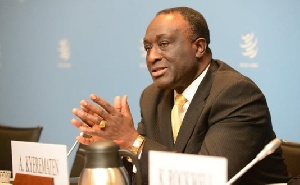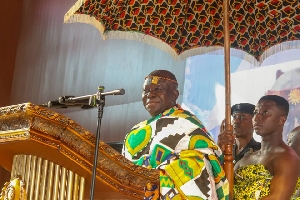- Home - News
- TWI News | TV
- Polls
- Year In Review
- News Archive
- Crime & Punishment
- Politics
- Regional
- Editorial
- Health
- Ghanaians Abroad
- Tabloid
- Africa
- Religion
- Election 2020
- Coronavirus
- News Videos | TV
- Photo Archives
- News Headlines
- Press Release
Opinions of Thursday, 27 April 2017
Columnist: William Dowokpor
Making the one-district-one factory policy a reality
The one district one factory policy vision that inspired hope of employment for the large number of the unemployed, when Ghanaians were presented with the choice of leadership in the 2016 general elections, was an attractive campaign promise that seemed to have made the difference for the then, opposition - New patriotic Party (NPP) now in government.
Typifying the “campaign in poetry but govern in prose” concept however, the one district one factory idea which is arguably one of the most important initiatives of the Nana Addo government, seems to be taking too long to crystalize even in terms of framework.
When the Minister for Trade and Industry appeared before the Appointments Committee of Parliament, as part of his appoint process, he attempted to re-cast the vision to make it clearer but the clarity was still lacking.
Subsequently the Minister of Finance and several other government appointees have given various shades of the policy, making the policy sound less poetic than was presented on the campaign platform.
Giving the policy a rather overly optimistic touch, a Financial Journalist wrote in January 2017; “Indeed, establishment of factories, under the new policy is expected within the first 100 days of the new government’s assumption of office”. The new government is over 100 days in office but details of the one district one factory policy vision are still trickling in, in prose.
Reality check:
To make the vision a reality, it is important to find out how the manufacturing sector has fared in Ghana at least for the past decade. Ghana Statistical Service (GSS) has just released year-on-year annual GDP growth rate for the Industry sector for 2016, which recorded a negative growth of -1.4 per cent.
The experiences of factories located in the industrial areas of Accra, Tema, Kumasi, Takoradi and Tamale where the infrastructure is relatively industrial, are vast and varied; and must be taken into account in the implementation of the new policy. We ignore those experiences and lessons at our own peril.
Clarifications that the factories will not be state owned but would come in the shape of Public Private Partnerships (PPP’s) does not necessarily answer the sustainability and or profitability questions.
Any manufacturing concern, public or private; that lacks the infrastructure and utilities to support smooth operations will suffer a great deal. The infrastructure gap typical in many districts should be prioritised as part of the fundamental issues to be addressed for the successful implementation of the policy.
Electricity:
The biggest challenge for manufacturing concerns in Ghana is the lack of reliable and affordable energy to run plants and machinery. Electric power is a most important input for existing manufacturing concerns. But the reality is that, it is expensive and unreliable. In other countries where industry has thrived, electric power is cheap and abundant. Tariffs for the manufacturing sectors are relatively cheaper compared to the domestic ones.
The idea behind such tariff regimes is to make the cost of production of goods cheaper in those countries for competitive advantage in global trade.
In Ghana, the consideration is different. Factories are known to be set up for profit and so long as the goal is profit, the tariff regime is set to wring it out of them, whether it makes them uncompetitive of not. Never mind that these manufacturing concerns pay taxes on profits made and create jobs for the people.
Besides the high cost of power, there is the lack of reliability that has led to many manufacturing businesses folding up. Those who cannot afford to manufacture at high cost but want to remain in business have settled for buying cheaper products from China to serve their customers.Many of the furniture manufacturing companies in Ghana do not make furniture here anymore. They import them!
New organisation:
Again, in clarifying how the one district one factory policy will be implemented, government officials have described a proposed new organisation that will partner a host of other institutions to make the vision a reality.
They include theGhana Investment Promotion Centre (GIPC), Telecom Companies, Town & Country Planning Department; Council for Scientific and Industrial Research (CSIR) National Board for Small Scale Industries (NBSSI), GRATIS Foundation, Venture Capital Trust Fund, the Commercial and Investment Banks, Insurance Companies, and the District Assemblies.
I am in support of all these proposed collaborators. But where are the Electric Power Companies, Ghana Water Company, Ghana Standards Board and the Ghana Revenue Authority that have key roles to play in making Ghana a competitive manufacturing hub for exports? Making electricity alone, reliable and affordable remains the key success factor for the one district one factory dream. That is my stand!











